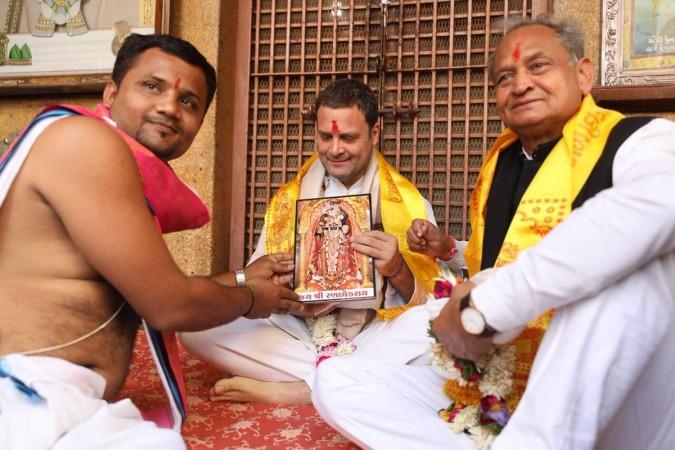
Rahul Gandhi has spent a lifetime in politics fighting his many Hamletian dilemmas. It's never been more difficult for any grand political scion anywhere else in the world. Unfairly so. Dismissed wholesale, jeered at and attacked as a foolhardy imposter, he has had it all.
At 47 he's India's de facto opposition leader and a future prime minister. His father Rajiv Gandhi was dead at that age. Yet Rahul's political persona has so far remained a shoddy work in progress. And that has given fodder to the opponents who want to send him to the incinerator.
Now, all that is changing with a fearless display of the intent to embrace Hinduism without looking like a dilettante and a Hamletian hesitant. It seems his doubts over Indian secularism, and that of the Grand Old Party, by extension, are finally over.
The latest display of Rahul's 'temple run' was in Karnataka, which goes to the polls in months. His temple visits ahead of elections in Uttar Pradesh were criticised mercilessly. He was a pseudo Hindu and the obeisance at temples was a sham. If, as alleged, the goal was to get votes, he failed there too.
Return of Hindu Rahul
The Hindu Rahul returned with vigour in Gujarat. And indeed, the party's fortunes at the hustings changed. However, he was still accused of treading 'soft-Hindutva' line on the one hand and being a pseudo Hindu on the other.
The BJP under LK Advani grabbed sizeable swathes of political turf in North India by accusing the Congress of being 'pseudo secular.' Of course, the Nehruvian legacy that the Congress shared earned that epithet. In any case, Indian secularism always remained a complex concept; only BJP's secularism was very well defined. That clarity paid them electoral dividends.
Now under Rahul Gandhi, the Congress is veering around to that point. And it's good for India's secularism, besides being also good for the Congress party. A Rahul Gandhi who unapologetically visits and prays at temples is by far a better guardian of India's secularism than his agnostic great-grandfather Jawaharlal Nehru.
In its plain old definition that's accepted all over the world in general, secularism means the separation of the state and religion. India doesn't qualify under this norm; for example, Yogi Adityanath is the Chief minister of Uttar Pradesh and the head priest of the Gorakhnath Matt. In the 1080s a catholic priest was elected to the Karnataka legislative assembly.
India's secularism is not so much about separation of state and religion as about promising equal rights to people of all religions. That fine line between rejection of religion and prevention of the emergence of a theocratic state was the great contribution of our Independence leaders.
Nehruvian secularism was about rejection of all religiosity from public life, while the Gandhian version gave a proper counterweight to that. For Gandhi prayer and religiosity were inseparable from political action. One religion had no upper hand in his India; he espoused the right of everyone to practise their religion.
42nd Amendment
When the constitution was drafted, 'secular' was not there in the Preamble. BR Ambedkar and others opposed the inclusion of the word secular -- not because they were not secular as we know it. For the founding fathers, an India which is enshrined as a republic, and is democracy that offers equality and freedom to all, could not but be secular.
However, when that belief was seriously challenged, when the secular essence was under threat, the word made a retune. That was the use of the 42nd Amendment to the Constitution in 1976, at the height of the Emergency declared by Indira Gandhi. Curiously, that controversial amendment also saw the inclusion of the word 'socialist' in the Preamble.
Was it probably the result of the realisation that came a quarter century after the republic's birth that India wasn't secular and socialist? Probably yes. In effect, it just proved that Congress's Spartan version of Nehruvian socialism was too vulnerable.
It was easy to brand the party as pro-minority, pro-Muslim and anti-Hindu. And it's no secret that electoral compulsions led the party to play the 'majority terror' bogey from time to time.
That's how the Congress came to be termed as the primary reason for a change in the Constitution.
"Some people say the Constitution says secular and you must accept it. We will respect the Constitution, but the Constitution has changed several times and it will change in the future too ... We are here to change the Constitution and we'll change it." -- This is what a Union minister from Karnataka said in December.
Rahul's new found religious fervour, it appears, is the bulwark against such a change in the Constitution.









